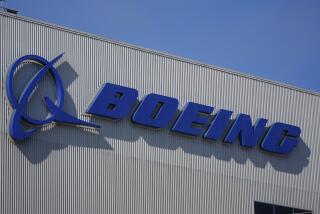MAI Changes Offer for Prime to Cash
- Share via
MAI Basic Four Inc., hoping to keep alive its chances of acquiring Prime Computer’s minicomputer business, revised its offer Tuesday to $525 million in cash.
MAI had offered $450 million in cash and notes with a face value of $150 million. Analysts expect the new all-cash offer to be more attractive to Prime’s lenders because of uncertain market value of the securities that MAI had offered.
MAI, a Tustin computer maker controlled by New York investor Bennett S. LeBow, recently dropped its nine-month effort to buy all of Prime. It now seeks to buy only Prime’s minicomputer business, which accounts for one-third of sales at the computer company based in Natick, Mass.
Prime has rebuffed all of MAI’s previous overtures. On June 23, it agreed to be acquired by J.H. Whitney & Co., a New York venture-capital firm, in a deal valued at $1.4 billion. The Whitney buyout hit a snag last week, however, when Chemical Bank in New York and First National Bank of Boston asked Whitney to raise more financing because of Prime’s deteriorating financial condition.
The bank’s request came one day before Prime reported a $19-million loss for the quarter ended June 30. In the same quarter last year, it posted a $7.2-million profit.
Whitney has said it is negotiating with potential lenders to try to raise more money. Donald Ackerman, a Whitney general partner, declined to comment Tuesday on efforts to get that financing.
Some analysts have said Whitney’s financing difficulties could help MAI’s chances.
MAI said in a prepared statement that it had amended its offer, which expires Aug. 9, “with a view to simplifying the choices available” to Prime’s directors and shareholders. A company spokeswoman declined further comment Tuesday.
Prime spokesman Joe Gavaghan said the company’s board would meet to review MAI’s new offer.
Gavaghan said sales representatives, engineers and other workers have defected as the battle has dragged on, and customers have withheld orders.
“Our attrition rates were and are greater than they normally are, and that is largely due to the uncertainty, not knowing what the future of the company is going to be,” Gavaghan said.
Prime’s stock traded Tuesday at $15.75 a share, down from a high of $21 earlier this year and $4 a share below the estimated value of Whitney’s offer.
MAI posted net income of $7.9 million for the six months, ended March 31, in contrast with $11.9 million in earnings in the same period last year. The company, which will not make its next earnings report until Aug. 14, said it has been hurt by “adverse publicity generated as a result of Prime’s efforts to resist” its offer.
MAI’s stock, which traded as high as $21 a share before the November takeover bid, has wallowed in the $5-a-share range.
Wall Street arbitragers and investors were hard-pressed to name a takeover battle that has dragged on as long and as publicly as the fight for Prime.
“I think there’s a general feeling of disgust out there,” said Joseph Sheer, manager of risk arbitrage for McKinley Allsopp Inc.
“This unending saga isn’t good for customers, it isn’t good for employees,” said David Wu, an analyst with S.G. Warburg Inc. “This unending saga only makes lawyers rich.”
Reuters contributed to this report.






